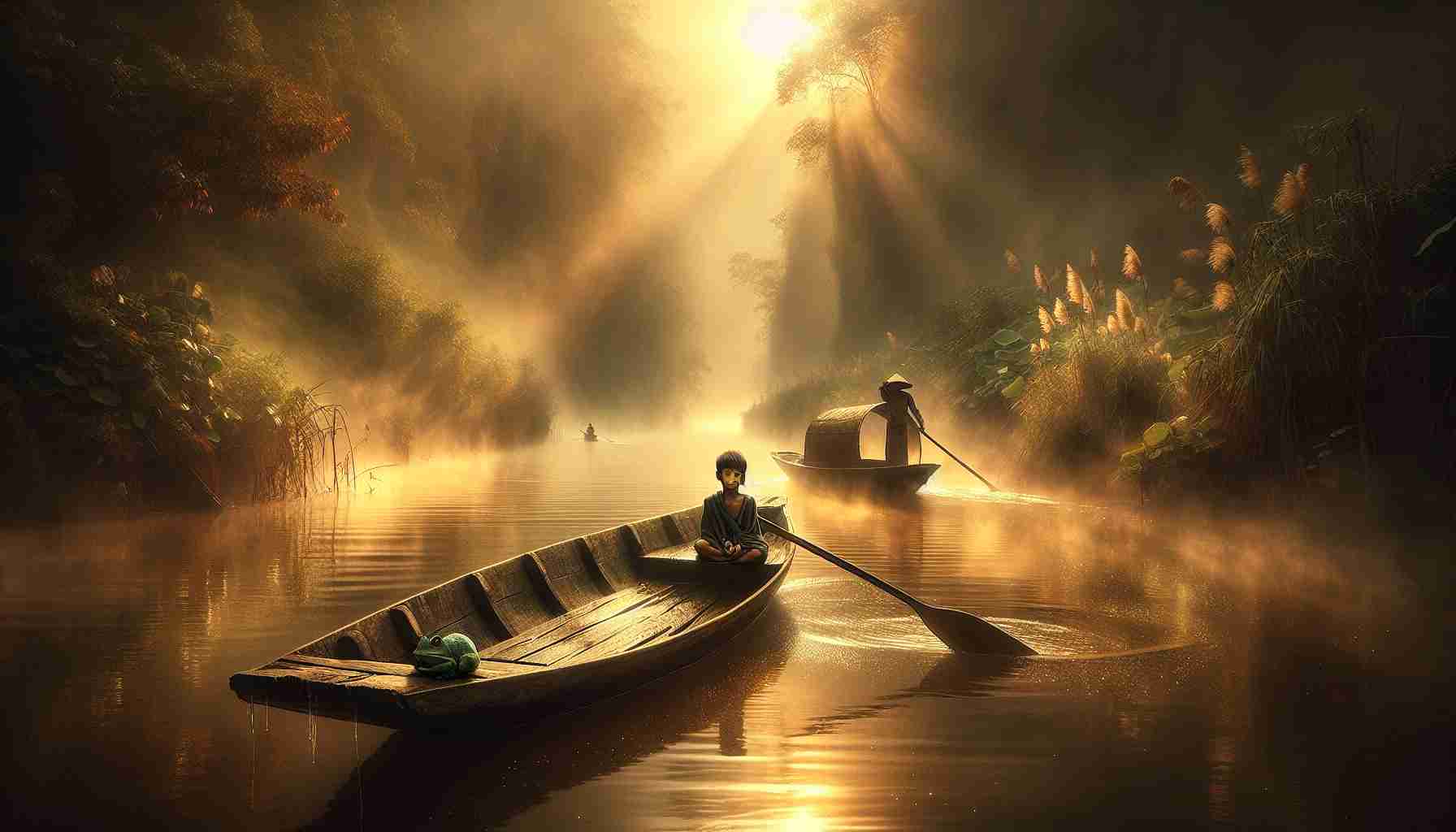

The river was quiet that morning. Mist drifted over the surface like a soft blanket. I was just a boy then, maybe ten years old, riding in a small wooden boat with my uncle Yen. He was a simple man—he fished, told stories, and smiled more than anyone I knew. That morning, I didn’t feel like smiling. I clenched my fists as the boat moved slowly across the water.
“What’s wrong, little river crab?” my uncle asked, using his favorite nickname for me.
“I don’t want to share my kite with the others,” I muttered. “They always break things. It’s better if I just keep it safe.”
Uncle Yen didn’t answer right away. Instead, he paddled slowly through the mist. We sat in silence for a time, only the sound of water tapping against the boat.
Then, ahead of us, a boat appeared through the fog. It floated toward us, but no one was in it.
“Grab the side,” Uncle Yen said gently. I reached out and pulled the empty boat toward us. It was old, with peeling paint and a sleepy creak in its wood. There was a leaf stuck inside, and a small frog sitting like it had nowhere better to be.
“Whose boat is it?” I asked.
“No one’s,” Uncle Yen replied. “It drifted here on its own, like the river planned it.”
We sat staring at it.
“Do you think it will hit us?” I asked.
“If it does, should we be mad at it?” he said.
I blinked. “I guess not. It didn’t mean to.”
“Exactly,” he said, smiling slowly. “The boat is empty. It doesn’t try. It doesn’t fight. It just follows the flow.”
I looked back at the frog, still sitting there, unbothered by everything.
“That’s how the Tao works,” Uncle said softly. “The Way doesn’t push or pull. It just moves, easy and simple. That’s wu wei—non-action that gets everything done.”
I stared at the boat. “But how does that help with my kite?”
Uncle Yen gently tapped the water with his paddle. “When you hold on too tight, the string snaps. When you share, you float. Like this boat.”
I didn’t answer, but something inside me felt different. Lighter. Like the boat without anyone inside had carried away some of my anger.
As we floated home, I watched the empty boat drift farther down the river. It bobbed and turned, never fighting the current, never trying to lead. But still, it moved forward—peacefully.
Later that day, I let the others fly my kite. I watched it rise higher than ever before, soaring like it had been waiting for that moment all along.
I didn’t change overnight. I still had moments when I wanted to keep things just for myself. But when I did, I’d remember that boat—that quiet lesson from the river. Let things flow. Be like the boat.
And the kite?
It flew better when I let go.
The river was quiet that morning. Mist drifted over the surface like a soft blanket. I was just a boy then, maybe ten years old, riding in a small wooden boat with my uncle Yen. He was a simple man—he fished, told stories, and smiled more than anyone I knew. That morning, I didn’t feel like smiling. I clenched my fists as the boat moved slowly across the water.
“What’s wrong, little river crab?” my uncle asked, using his favorite nickname for me.
“I don’t want to share my kite with the others,” I muttered. “They always break things. It’s better if I just keep it safe.”
Uncle Yen didn’t answer right away. Instead, he paddled slowly through the mist. We sat in silence for a time, only the sound of water tapping against the boat.
Then, ahead of us, a boat appeared through the fog. It floated toward us, but no one was in it.
“Grab the side,” Uncle Yen said gently. I reached out and pulled the empty boat toward us. It was old, with peeling paint and a sleepy creak in its wood. There was a leaf stuck inside, and a small frog sitting like it had nowhere better to be.
“Whose boat is it?” I asked.
“No one’s,” Uncle Yen replied. “It drifted here on its own, like the river planned it.”
We sat staring at it.
“Do you think it will hit us?” I asked.
“If it does, should we be mad at it?” he said.
I blinked. “I guess not. It didn’t mean to.”
“Exactly,” he said, smiling slowly. “The boat is empty. It doesn’t try. It doesn’t fight. It just follows the flow.”
I looked back at the frog, still sitting there, unbothered by everything.
“That’s how the Tao works,” Uncle said softly. “The Way doesn’t push or pull. It just moves, easy and simple. That’s wu wei—non-action that gets everything done.”
I stared at the boat. “But how does that help with my kite?”
Uncle Yen gently tapped the water with his paddle. “When you hold on too tight, the string snaps. When you share, you float. Like this boat.”
I didn’t answer, but something inside me felt different. Lighter. Like the boat without anyone inside had carried away some of my anger.
As we floated home, I watched the empty boat drift farther down the river. It bobbed and turned, never fighting the current, never trying to lead. But still, it moved forward—peacefully.
Later that day, I let the others fly my kite. I watched it rise higher than ever before, soaring like it had been waiting for that moment all along.
I didn’t change overnight. I still had moments when I wanted to keep things just for myself. But when I did, I’d remember that boat—that quiet lesson from the river. Let things flow. Be like the boat.
And the kite?
It flew better when I let go.